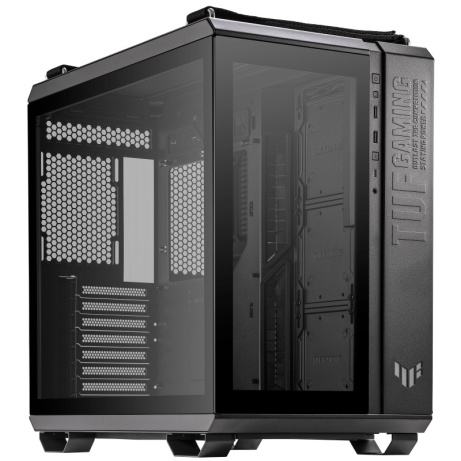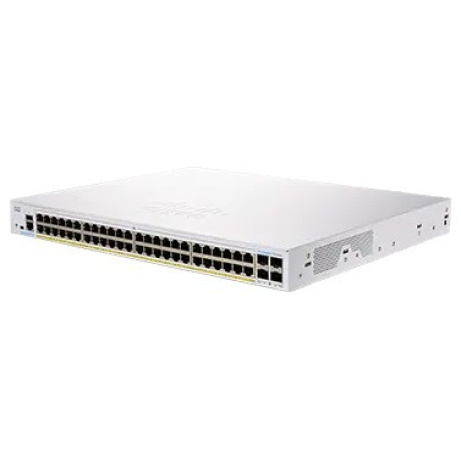 BOHEMIAPC počítačeNačítám kategorie
BOHEMIAPC počítačeNačítám kategorie Notebooky a UltrabookyNačítám kategorie
Notebooky a UltrabookyNačítám kategorie Mobilní telefony a tabletyNačítám kategorie
Mobilní telefony a tabletyNačítám kategorie Chytrá domácnostNačítám kategorie
Chytrá domácnostNačítám kategorie Herní zónaNačítám kategorie
Herní zónaNačítám kategorie- Konfigurátor sestav
Aktuální akční letáky
BAZAR - Cisco switch CBS250-48PP-4G (48xGbE,4xSFP,48xPoE+,195W) - Poškozený obal
Výrobce:Cisco
Kód produktu:i8_1608323
Part number:CBS250-48PP-4G-EU//BAZAR
EAN:1608323
Záruka:0 Om.Doživot
Dostupnost:
poslední kus sklademZboží může být skladem. O počtu se informujte. Po případném objednání sdělíme termín dodání.
k odeslání: 1 ks
Popis
Parametry produktu
BAZAR - Cisco switch CBS250-48PP-4G - poškozený obal
Řada Cisco Business 250 představuje novou generaci cenově dostupných inteligentních switchů, které kombinují vysoký síťový výkon, zabezpečení a spolehlivost s komplexní sadou síťových funkcí potřebných pro spolehlivou síť malých firem.
Záruka platná do End of Support 31. 10. 2029. Oznámení End of Life pro CISCO CBS250 Stránky produktu: CBS250-48PP-4G Quick start guide: Quick start guide| Switching capacity (All switches are wire-speed and nonblocking) | |
| Forwarding rate in millions of packets per second (mpps; 64-byte packets) | 77,38 |
| Switching capacity in Gigabits per second (Gbps) | 104 |
| Layer 2 switching | |
| Spanning Tree Protocol (STP) | Standard 802.1d spanning tree support Fast convergence using 802.1w (Rapid Spanning Tree Protocol [RSTP]), enabled by default Multiple spanning tree instances using 802.1s (MSTP); 8 instances are supported Per-VLAN Spanning Tree Plus (PVST+); 126 instances are supported Rapid PVST+ (RPVST+); 126 instances are supported |
| Port grouping/link aggregation | Support for IEEE 802.3ad Link Aggregation Control Protocol (LACP) Up to 4 groups Up to 8 ports per group with 16 candidate ports for each (dynamic) 802.3ad Link Aggregation Group (LAG) |
| VLAN | Support for up to 255 active VLANs simultaneously Port-based and 802.1Q tag-based VLANs Management VLAN Guest VLAN |
| Voice VLAN | Voice traffic is automatically assigned to a voice-specific VLAN and treated with appropriate levels of QoS. Voice Services Discovery Protocol (VSDP) delivers networkwide zero-touch deployment of voice endpoints and call control devices |
| Generic VLAN Registration Protocol (GVRP) and Generic Attribute Registration Protocol (GARP) | Protocols for automatically propagating and configuring VLANs in a bridged domain |
| IGMP (versions 1, 2, and 3) snooping | Internet Group Management Protocol (IGMP) limits bandwidth-intensive multicast traffic to only the requesters; supports 255 multicast groups (source-specific multicasting is also supported) |
| IGMP querier | Used to support a Layer 2 multicast domain of snooping switches in the absence of a multicast router |
| HOL blocking | Head-of-Line (HOL) blocking prevention |
| Loopback detection | Provides protection against loops by transmitting loop protocol packets out of ports on which loop protection has been enabled. It operates independently of STP. |
| Layer 3 routing | |
| IPv4 routing | Wire-speed routing of IPv4 packets Up to 32 static routes and up to 16 IP interfaces |
| IPv6 routing | Wire-speed routing of IPv6 packets |
| Layer 3 interface | Configuration of Layer 3 interface on physical port, LAG, VLAN interface, or loopback interface |
| Classless Interdomain Routing (CIDR) | Support for CIDR |
| Dynamic Host Configuration Protocol (DHCP) relay at Layer 3 | Relay of DHCP traffic across IP domains |
| User Datagram Protocol (UDP) relay | Relay of broadcast information across Layer 3 domains for application discovery or relaying of Bootstrap Protocol (BootP)/DHCP packets |
| Security | |
| Secure Sockets Layer (SSL) | SSL encrypts all HTTPS traffic, allowing secure access to the browser-based management GUI in the switch |
| Secure Shell (SSH) Protocol | SSH is a secure replacement for Telnet traffic. Secure Copy (SCP) also uses SSH. SSH v1 and v2 are supported. |
| IEEE 802.1X (authenticator role) | Remote Authentication Dial-In User Service (RADIUS) authentication, guest VLAN, single/multiple host mode, and single/multiple sessions |
| STP loopback guard | Provides additional protection against Layer 2 forwarding loops (STP loops) |
| Secure Core Technology (SCT) | Ensures that the switch will receive and process management and protocol traffic no matter how much traffic is received |
| Secure Sensitive Data (SSD) | A mechanism to manage sensitive data (such as passwords, keys, and so on) securely on the switch, populating this data to other devices, and secure autoconfig. Access to view the sensitive data as plain text or encrypted is provided according to the user-configured access level and the access method of the user |
| Trustworthy systems | Trustworthy systems provide a highly secure foundation for Cisco products Run-time defenses (Executable Space Protection [X-Space], Address Space Layout Randomization [ASLR], Built-In Object Size Checking [BOSC]) |
| Port security | Ability to lock source MAC addresses to ports and limit the number of learned MAC addresses |
| RADIUS | Supports RADIUS authentication for management access. Switch functions as a client. |
| Storm control | Broadcast, multicast, and unknown unicast |
| DoS prevention | Denial-of-Service (DoS) attack prevention |
| Multiple user privilege levels in CLI | Level 1, 7, and 15 privilege levels |
| Access Control Lists (ACLs) | Support for up to 512 rules Drop or rate limit based on source and destination MAC, VLAN ID or IPv4 or IPv6 address, IPv6 flow label, protocol, port, Differentiated Services Code Point (DSCP)/IP precedence, TCP/UDP source and destination ports, 802.1p priority, Ethernet type, Internet Control Message Protocol (ICMP) packets, IGMP packets, TCP flag; ACL can be applied on both ingress and egress sides Time-based ACLs supported |
| QoS | |
| Priority levels | 8 hardware queues |
| Scheduling | Strict priority and Weighted Round-Robin (WRR) queue assignment based on DSCP and class of service (802.1p/CoS) |
| Class of service | Port based; 802.1p VLAN priority based; IPv4/v6 IP precedence/Type of Service (ToS)/DSCP based; Differentiated Services (DiffServ); classification and re-marking ACLs, trusted QoS |
| Rate limiting | Ingress policer; egress shaping and rate control; per VLAN, per port, and flow based |
| Congestion avoidance | A TCP congestion avoidance algorithm is required to reduce and prevent global TCP loss synchronization |
| Standards | |
| Standards | IEEE 802.3 10BASE-T Ethernet, IEEE 802.3u 100BASE-TX Fast Ethernet, IEEE 802.3ab 1000BASE-T Gigabit Ethernet, IEEE 802.3ad Link Aggregation Control Protocol, IEEE 802.3z Gigabit Ethernet, IEEE 802.3x Flow Control, IEEE 802.3 ad LACP, IEEE 802.1D (STP), IEEE 802.1Q/p VLAN, IEEE 802.1w RSTP, IEEE 802.1s Multiple STP, IEEE 802.1X Port Access Authentication, IEEE 802.3af, IEEE 802.3at, RFC 768, RFC 783, RFC 791, RFC 792, RFC 793, RFC 813, RFC 879, RFC 896, RFC 826, RFC 854, RFC 855, RFC 856, RFC 858, RFC 894, RFC 919, RFC 920, RFC 922, RFC 950, RFC 951, RFC 1042, RFC 1071, RFC 1123, RFC 1141, RFC 1155, RFC 1157, RFC 1213, RFC 1215, RFC 1286, RFC 1350, RFC 1442, RFC 1451, RFC 1493, RFC 1533, RFC 1541, RFC 1542, RFC 1573, RFC 1624, RFC 1643, RFC 1700, RFC 1757, RFC 1867, RFC 1907, RFC 2011, RFC 2012, RFC 2013, RFC 2030, RFC 2131, RFC 2132, RFC 2233, RFC 2576, RFC 2616, RFC 2618, RFC 2665, RFC 2666, RFC 2674, RFC 2737, RFC 2819, RFC 2863, RFC 3164, RFC 3411, RFC 3412, RFC 3413, RFC 3414, RFC 3415, RFC 3416, RFC 4330 |
| IPv6 | |
| IPv6 | IPv6 host mode IPv6 over Ethernet IPv6/IPv4 Dual Stack IPv6 Neighbor Discovery (ND) IPv6 stateless address auto configuration Path Maximum Transmission Unit (MTU) discovery Duplicate Address Detection (DAD) Internet Control Message Protocol (ICMP) version 6 IPv6 over IPv4 network with Intrasite Automatic Tunnel Addressing Protocol (ISATAP) support USGv6 and IPv6 Gold Logo certified |
| IPv6 QoS | Prioritize IPv6 packets in hardware |
| IPv6 ACL | Drop or rate limit IPv6 packets in hardware |
| Multicast Listener Discovery (MLD v1/2) snooping | Deliver IPv6 multicast packets only to the required receivers |
| IPv6 applications | Web/SSL, Telnet server/SSH, Ping, Traceroute, Simple Network Time Protocol (SNTP), Trivial File Transfer Protocol (TFTP), Simple Network Management Protocol (SNMP), Remote Authentication Dial-In User Service (RADIUS), Syslog, DNS client, DHCP client, DHCP autoconfig |
| IPv6 RFCs supported | RFC 4443 (which obsoletes RFC 2463): ICMPv6 RFC 4291 (which obsoletes RFC 3513): IPv6 address architecture RFC 4291: IPv6 Addressing Architecture RFC 2460: IPv6 Specification RFC 4861 (which obsoletes RFC 2461): Neighbor Discovery for IPv6 RFC 4862 (which obsoletes RFC 2462): IPv6 Stateless Address Autoconfiguration RFC 1981: Path MTU Discovery RFC 4007: IPv6 Scoped Address Architecture RFC 3484: Default address selection mechanism RFC 5214 (which obsoletes RFC 4214): ISATAP tunneling RFC 4293: Management Information Base (MIB) IPv6: Textual Conventions and General Group RFC 3595: Textual Conventions for IPv6 Flow Label |
| Management | |
| Cisco Business Dashboard | Support for embedded probe for Cisco Business Dashboard running on the switch. Eliminates the need to set up a separate hardware or virtual machine for the Cisco Business Dashboard Probe on site. |
| Cisco Business mobile app | Mobile app for Cisco Business Switch and Wireless products. Helps to set up a local network in minutes and provide easy management at your fingertips. |
| Cisco Network Plug and Play (PnP) agent | The Cisco Network Plug and Play solution provides a simple, secure, unified, and integrated offering to ease new branch or campus device rollouts or for provisioning updates to an existing network. The solution provides a unified approach to provision Cisco routers, switches, and wireless devices with a near-zero-touch deployment experience. Supports Cisco PnP Connect |
| Web user interface | Built-in switch configuration utility for easy browser-based device configuration (HTTP/HTTPS). Supports configuration, wizards, system dashboard, system maintenance, and monitoring Basic and advanced mode for maximum operational efficiency |
| SNMP | SNMP versions 1, 2c, and 3 with support for traps, and SNMP v3 User-based Security Model (USM) |
| Remote monitoring (RMON) | Embedded RMON software agent supports 4 RMON groups (history, statistics, alarms, and events) for enhanced traffic management, monitoring, and analysis |
| IPv4 and IPv6 dual stack | Coexistence of both protocol stacks to ease migration |
| Firmware upgrade | Web browser upgrade (HTTP/HTTPS) and TFTP and upgrade over SCP running over SSH Dual images for resilient firmware upgrades |
| Port mirroring | Traffic on a port can be mirrored to another port for analysis with a network analyzer or RMON probe. Up to 4 source ports can be mirrored to one destination port |
| VLAN mirroring | Traffic from a VLAN can be mirrored to a port for analysis with a network analyzer or RMON probe. Up to 4 source VLANs can be mirrored to one destination port |
| Dynamic Host Configuration Protocol (DHCP) (options 12, 59, 60, 66, 67, 125, 129, and 150) | DHCP options facilitate tighter control from a central point (DHCP server), to obtain IP address, autoconfiguration (with configuration and image file download), DHCP Relay, and host name |
| Secure Copy (SCP) | Securely transfers files to and from the switch |
| Autoconfiguration with SCP file download | Enables mass deployment with protection of sensitive data |
| Text-editable configs | Config files can be edited with a text editor and downloaded to another switch, facilitating easier mass deployment |
| Smartports | Simplified configuration of QoS and security capabilities |
| Auto Smartports | Automatically applies the intelligence delivered through the Smartports roles to the port based on the devices discovered over Cisco Discovery Protocol or LLDP-MED. This facilitates zero-touch deployments. |
| Text view Command-Line Interface (CLI) | Scriptable CLI. A full CLI as well as a menu-based CLI is supported. User privilege levels 1, 7, and 15 are supported for the CLI. |
| Localization | Localization of GUI and documentation into multiple languages |
| Login banner | Configurable multiple banners for web as well as CLI |
| Other management | Traceroute; single IP management; HTTP/HTTPS; RADIUS; port mirroring; TFTP upgrade; DHCP client; Simple Network Time Protocol (SNTP); cable diagnostics; Ping; syslog; Telnet client (SSH secure support); automatic time settings from Management Station |
| Green (power efficiency) | |
| Energy detect | Automatically turns power off on RJ-45 port when detecting link down. Active mode is resumed without loss of any packets when the switch detects the link is up |
| Cable length detection | Adjusts the signal strength based on the cable length. Reduces the power consumption for shorter cables |
| EEE compliant (802.3az) | Supports IEEE 802.3az on all copper Gigabit Ethernet ports |
| Disable port LEDs | LEDs can be manually turned off to save on energy |
| Time-based port operation | Link up or down based on user-defined schedule (when the port is administratively up) |
| Time-based PoE | PoE power can be on or off based on user-defined schedule to save energy |
| General | |
| Jumbo frames | Frame sizes up to 9K bytes. The default MTU is 2K bytes |
| MAC table | 8K addresses |
| Discovery | |
| Bonjour | The switch advertises itself using the Bonjour protocol |
| Link Layer Discovery Protocol (LLDP) (802.1ab) with LLDP-MED extensions | Link Layer Discovery Protocol (LLDP) allows the switch to advertise its identification, configuration, and capabilities to neighboring devices that store the data in a MIB. LLDP-MED is an enhancement to LLDP that adds the extensions needed for IP phones |
| Cisco Discovery Protocol | The switch advertises itself using the Cisco Discovery Protocol. It also learns the connected device and its characteristics using Cisco Discovery Protocol |
| Power over Ethernet | |
| 802.3at PoE+ and 802.3af PoE delivered over any of the RJ-45 ports within the listed power budgets | The following switches support 802.3at PoE+, 802.3af, and Cisco prestandard (legacy) PoE. Maximum power of 30.0W to any 10/100 or Gigabit Ethernet port, until the PoE budget for the switch is reached. The total power available for PoE per switch is as follows: |
| Power dedicated to PoE | 195 W |
| Number of ports that support PoE | 48 |
| Hardware | |
| Power Consumption | |
| System power consumption | 110V=68.68W 220V=67.18W |
| Power consumption (with PoE) | 110V=276.75W 220V=270.58W |
| Heat dissipation (BTU/hr) | 944.31 |
| Ports | |
| Total system ports | 52 Gigabit Ethernet |
| RJ-45 ports | 48 Gigabit Ethernet |
| Combo ports (RJ-45 + SFP) | 4 SFP |
| Console port | Cisco Standard RJ45 console port |
| USB slot | USB Type-A slot on the front panel of the switch for easy file and image management |
| Buttons | Reset button |
| Cabling type | Unshielded Twisted Pair (UTP) Category 5e or better for 1000BASE-T |
| LEDs | System, Link/Act, PoE, Speed |
| Flash | 256 MB |
| CPU | 800 MHz ARM |
| DRAM | 512 MB |
| Packet Buffer | |
| Packet buffer | 3 MB |
| Supported SFP Modules | |
| MGBSX1 | Multimode fiber |
| MGBLX1 | Single-mode fiber |
| MGBLH1 | Single-mode fiber |
| MGBT1 | UTP Category 5 |
| GLC-SX-MMD | Multimode fiber |
| GLC-LH-SMD | Single-mode fiber |
| GLC-BX-U | Single-mode fiber |
| GLC-BX-D | Single-mode fiber |
| GLC-TE | UTP cat 5e |
| Environmental | |
| Unit dimensions (W x D x H) | 445 x 350 x 44 mm (17.5 x 13.78 x 1.73 in) |
| Unit weight | 5.43 kg (11.97 lb) |
| Power | 100 to 240V 50 to 60 Hz, internal, universal |
| Certifications | UL (UL 62368), CSA (CSA 22.2), CE mark, FCC Part 15 (CFR 47) Class A |
| Operating temperature | 23° to 122°F (-5° to 50°C |
| Storage temperature | -13° to 158°F (-25° to 70°C) |
| Operating humidity | 10% to 90%, relative, noncondensing |
| Storage humidity | 10% to 90%, relative, noncondensing |
| Acoustic Noise and Mean Time Between Failure (MTBF) | |
| Fan (number) | 1 |
| Acoustic noise | 25°C: 37.3 dBA |
| MTBF @ 25°C (hours) | 1206349 |
| Warranty | |
| Limited lifetime | |
| Package contents | |
| Package contents | Cisco Business 250 Series Smart Switch Power cord Mounting kit Quick start guide |
Maximální počet portů:52
Provedení:Rack mounted 19"
Technologie:Gigabit ethernet + Gigabit optika
Management:SNMP/RMON
PoE budget (W):195
Přenosová rychlost LAN (Mb/s):1000
Funkce:L2
Počet SFP portů:4
Podporované standardy PoE:802.3at
Počet portů LAN:48
Ventilátor:Ano
Počet PoE+ portů:48
Počet portů LAN:48
Maximální počet portů:52
Počet SFP portů:4
PoE budget (W):195
Počet PoE+ portů:48

